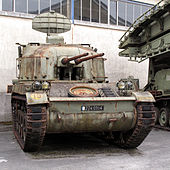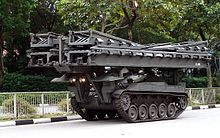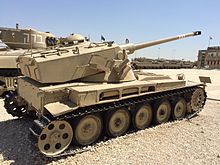The AMX-13 is a French light tank produced from 1952 to 1987. It served with the French Army, as the Char 13t-75 Modèle 51, and was exported to more than 25 other nations. Named after its initial weight of 13 tonnes, and featuring a tough and reliable chassis, it was fitted with an oscillating turret built by GIAT Industries (now Nexter) with revolver type magazines, which were also used on the Austrian SK-105 Kürassier. Including prototypes and export versions, there are over a hundred variants including self-propelled guns, anti-aircraft systems, APCs, and ATGM versions.
Development
The tank was designed at the Atelier de Construction d’Issy-les-Moulineaux (AMX) in 1946 to meet a requirement for an air-portable vehicle to support paratroopers. The first prototype ran from 1948. The compact chassis had torsion bar suspension with five road-wheels and two return rollers; the engine runs the length of the tank on the right side, with the driver on the left. It features an uncommon two-part FL-10 oscillating turret, where the gun is fixed to the turret and the entire upper turret changes elevation. The turret is set to the rear of the vehicle and holds the commander and gunner. The original 75 mm gun was loaded by an automatic loading system fed by two six-round magazines located in on either side of the automatic loader in the turret’s bustle. The 12 rounds available in the drum magazines meant that the crew could engage targets quickly; however, once those rounds were expended, the vehicle had to retreat to cover and the crew had to reload shells from outside the vehicle.
Production began at ARE (Atelier de Construction Roanne) in 1952, with the first tanks delivered the following year. In 1964, production was transferred to Creusot-Loire at Chalon-sur-Saône, as ARE switched to the production of the AMX-30 MBT, and the numbers produced declined significantly.
After 1966, AMX-13s in French service were up-gunned with a 90mm F3 medium pressure gun firing more effective high-explosive anti-tank (HEAT) munitions; this variant was designated AMX-13/90. The F3 was similar to the DEFA D921/F1 low pressure gun developed for the Panhard AML-90, and even utilized the same ammunition, though it possessed a significantly higher muzzle velocity. By the late 1960s, an export model of the AMX-13 was also available with an even larger 105mm gun in a FL-12 turret.
Although there were many variants on the turret, the basic chassis was almost unchanged until 1985, when changes including a new diesel engine, fully automatic transmission and new hydropneumatic suspension were introduced. Production halted with the AMX-13 Model 1987. After sales support and upgrades are still offered through GIAT Industries (now Nexter).
The AMX-13 tank was phased out of service with the French Army in the 1980s. Current French armoured vehicles with a similar role are the ERC 90 Sagaie and the AMX 10 RC.
Additional characteristics

Close view of oscillating turret
- Ground clearance: 370 mm (15 in)
- Fording: 600 mm (24 in)
- Vertical obstacle 650 mm (26 in)
- Trench: 1.6 m (5 ft 3 in)
- Gradient 60%
- Side slope: 60%
- NBC system: None
- Night vision: Optional
Service history
France
During the Suez Crisis of 1956, the French Army used two sections of the 2nd Foreign Cavalry Regiment’s AMX-13 tanks in Port Fouad. The AMX-13s also saw limited action in the Algerian War, largely due to the rough terrain in most of Algeria and much of the fighting with the anti-colonial guerillas being in the difficult terrain of the countryside. France also fielded a number of AMX-13s fitted with US Chaffee light tank turrets in the fighting in Algeria.
Decommissioned Israeli AMX-13 on display at Yad La-Shiryon Tank Museum in Latrun.
Dominican Republic
AMX-13s saw service among both the loyalists and the rebels during the Dominican Civil War of 1965. Two AMX-13s used by the rebel forces were destroyed by M50 Ontos of the United States Marine Corps during the subsequent American intervention in the Dominican Republic.
Israel
The AMX 13 was Israel’s first modern tank and was purchased at a time when France was the only country willing to openly sell arms to Israel. By 1956, Israel had received 180 AMX-13 light tanks as part of an agreement to reinforce Israel’s military and to maintain the balance in Israel’s favour after the Egyptian–Czechoslovak arms agreement. Besides buying whole AMX-13s, Israel also purchased a quantity of 75mm main guns of these light tanks for fitting (upgunning) into other tanks in their inventory, such as the American M4 Sherman. Due to the shortage of tanks, the IDF used them as main battle tanks and employed them to form a tank battalion in the 7th Armored Brigade. IDF reconnaissance units did not use AMX 13s.
By 1967, Israel had acquired about 400 AMX-13s and formed three AMX-13 battalions, all of which fought actively on all fronts during the Six-Day War. The first battalion moved south in the West Bank area through Taluzi and Tubas and occupied Nablus (against Jordan). The second, attacking Egypt, captured the strongpoints protecting the Gaza Strip and the coastal road in the north of the Sinai Peninsula. The third, finally, assaulted the Golan Heights in south-western Syria.
The IDF realised that the AMX-13 tank was too lightly-armoured and had a weak main gun. Losses were heavy at places like Rafah Junction and Jiradi Pass during the Six-Day War with many destroyed by heavier Arab-fielded Soviet armour, such as T-55 MBTs and IS-3 heavy tanks. Subsequently, Israel gradually phased out all of its AMX-13s following the Six-Day War, with most ending up being sold to the then newly established Singapore Army between 1968 and 1969.
India
During the 1965 Indo-Pak War, India deployed AMX-13 Tanks to oppose the initial armour onslaught of Operation Grand Slam in the Chhamb-Jaurian area and also in the Battle of Asal Uttar.
During the 1965 Indo-Pakistani War in Chhamb-Jaurian in Jammu & Kashmir, the 20 Lancers, equipped with AMX-13 tanks was under command of the 10th Infantry Division. Pakistan’s surprise attack on 1 September, Operation Grand Slam, fell on 191 Infantry Brigade which was supported by ‘C’ Squadron of the regiment, under Maj Bhaskar Roy. The Pakistani armoured attack comprised two regiments, one each of M-48 Patton medium tanks and M-36 Sherman B-2 tank destroyers. The attack began at 0805 hours and was strongly resisted. During the initial phases of the attack, Roy destroyed 6 Pattons, 3 recoilless guns and captured a jeep. A second attack was launched by Pakistani armour at 1100 hours and contested by the AMX-13s of 20 Lancers, which despite being outgunned and outnumbered, destroyed a total 13 tanks that day and prevented the encirclement of 191 Infantry Brigade. The regiment later fought in the defence of Jaurian under 41 Infantry Brigade. For the defense of Chhamb-Jaurian, the regiment was awarded a theatre honour and Maj Bhaskar Roy was awarded Maha Vir Chakra for his leadership in this action.
In the Battle of Assal Uttar fought from 8 to 10 September 1965 in Asal Uttar (Khem Karan, Punjab, India), a regiment of AMX-13s — 8th Light Cavalry — along with a regiment each of Centurions and M4 Shermans fought off and defeated a Pakistani armoured offensive comprising five regiments of M48 Patton tanks and one regiment of M24 Chaffee tanks.
Lebanon
Lebanese AMX-13s saw extensive service during the Lebanese Civil War in the hands of the Lebanese Army and various armed groups in and outside Beirut between 1975 and 1990, following the collapse of the Lebanese Armed Forces (LAF) structure in January 1976, and later again in February 1984 in the wake of the Mountain War. During this period, most of the regular Army’s AMX-13s fell into the hands of the competing Christian-rightist Lebanese Front and Muslim-leftist Lebanese National Movement (LNM) militias or were taken way by dissident rebellious Lebanese Army factions. France later delivered additional AMX-13s to the regular Lebanese Army between 1978 and 1981. Captured AMX-13s were employed by the Lebanese Arab Army (LAA), Army of Free Lebanon (AFL), Kataeb Regulatory Forces (KRF), Tigers Militia, Lebanese Forces (LF), South Lebanon Army (SLA), Amal Movement, and the People’s Liberation Army (PLA). Nearly all AMX-13s eventually were returned by the demobilized militias to the Lebanese Army between 1990 and 1993.
In July 2018, six of these withdrawn AMX-13 and various other former Lebanese Army military vehicles were dumped in the sea off the coast of Sidon in southern Lebanon and used as part of an artificial reef.
Morocco
Morocco used some AMX-13s in the Sand War of 1963. Later on, they were engaged in the Western Sahara conflict. They were supplemented by the similar Austrian SK-105 Kürassier light tank during that war.
Prototypes
- Char AMX-13 (2A): Prototype with 4 roadwheels and trailing idler
- Char AMX-13 (2B): Prototype with 5 roadwheels and raised idler
- Char AMX-13 (2C): Prototype with FL-10 turret and two support rollers
- Char AMX-13 (2D): Prototype with 4 support rollers
- Char AMX-13 (2E): Prototype with 3 support rollers and 90 mm gun
- Char AMX-13 (2F): Prototype with 2 support rollers and, later, a thermal sleeve
Other prototypes
- AMX-13 avec tourelle: A14 Fitted with a German HS-30 turret
- AMX-13/105: Fitted with a 105 mm howitzer barrel
- AMX-13/75 (AMX-13e): Experimental variant with a short-barreled 75 mm in FL-11 turret
- Char AMX-13 avec Canon 57 L/100: Prototype with a special gun
- AMX-13 Twin 20 mm in a welded turret without a bustle
- Char 48FCM: AKA Char 12T FCM, DCA de Quatre Canons de 20 mm—4 x 20 mm cannon in an FL-4 turret
- DCA de 40 mm: AKA Char 13T DCA a 40 mm Bofors L/70 gun in a large faceted turret
- AMX-13 GTI: Improved suspension by Krauss-Maffei
- AMX-13 THS: Prototype fitted with hydrostatic transmission
- AMX-13: Fitted with Rapace 14 MBRL
- AMX-13 HOT: Fitted with HOT ATGM launchers
Production variants

SS.11 anti-tank missile-launcher version of the AMX-13

AMX-13 DCA AA version

Modified AMX VCI (APC version of the AMX-13) with the American M55 turret

The Singapore Army’s AMX-13 Armoured Vehicle-Launched Bridge (AVLB)
- AMX-Chaffee: Some initial vehicles were fitted with the turret of the M24 Chaffee
- AMX-13 : Initial vehicles with the turret of the M24 Chaffee converted into a driver training tank. Gun removed.
- AMX-13/75 Modèle 51: High-velocity 75 mm Gun in FL-11 turret as installed in Panhard EBR armoured car, with two top rollers
- AMX-13/75 Modèle 51: High-velocity 75 mm Gun in FL-11 turret, with four top rollers and revised stowage
- AMX-13 T75 (Char Lance SS-11): Fitted with SS.11 ATGM launchers
- AMX-13 T75 avec TCA: Fitted with an electronic guidance system for the missiles
- AMX-13/90 Modèle 52: FL-10 turret refitted with the F3 90 mm gun
- AMX-13/90 LRF: Fitted with a laser rangefinder
- AMX-13/105 Modèle 58: Fitted with a 105mm Gun in an FL-12 turret (used by the Argentine Army and the Netherlands)
- AMX-13/105: Upgraded export version of the Modele 58 with a thermal sleeve and a revised hull front
- AMX-13 Model 1987
Late production version
- AMX-13 DCA 30: SPAAG version with a retractable radar and two 30mm cannons fitted; 60 were produced beginning in 1969.
- AMX-13 : AMX-13 with the turret removed; used for driver training
- AMX-13 Modèle 55 (AMX-D): Recovery version
- AMX-13 PDP (Poseur De Pont) Modèle 51: Scissors-type bridgelayer
Modernisation packages
- Cockerill 90 mm Regunning Packaging: 90 mm upgunning package
- Giat Industries upgrade with a Baudouin 6F 11 SRY diesel engine and an upgraded turret
- Giat Industries Add-on Armour package installed on turret front/sides and glacis plate
- NIMDA Upgrade Package: Israeli retrofit package
- INDRA Amazon Fire Control System upgrade with thermal imaging and a laser rangefinder
National
Netherlands
- AMX-13/FL-12: Dutch upgrade fitted with a searchlight and FN MAG machine guns
- AMX-13/FL-15: Dutch FL-12 version refitted with an FL-15 Turret
Singapore

The Singapore Army’s AMX-13/SM-1 (Singapore Modernised 1)
- AMX-13S Rebuild of standard AMX-13/75 Modèle 51 (FL-11) by Singapore prior to SM-1 upgrade.
- AMX-13SM1 (Singapore Modernised 1): Singaporean upgrade with modern communications, a new diesel engine replacing the original petrol engine, improved transmissions/suspensions system, laser range-finder and night vision elbow upgrade by ST Kinetics. The 75 mm main gun remained unchanged.
- Switzerland
- Leichter Panzer 51: Swiss Army version
- Peru
- AMX-13PA5 Escorpion Proposed upgrade for a standard AMX-13/105 by the Peruvian designer Sergio Casanave, fitted with modern communications and four 9M14-2T anti-tank guided missiles.
- AMX-13PA8 Escorpion-2 Equipped with Dante fire-control system (a ballistic computer/laser range-finder/night vision/CCTV system). Four Ukrainian laser-guided Barrier R-2 anti-tank missiles and 7.62 mm and 12.7 mm machine-guns were also proposed.
- Venezuela
- AMX-13V CLI upgraded AMX-13/90 for Venezuelan Army
- AMX-13 Venezuelan MLRS version armed with IMI LAR-160 mm rockets
- AMX-13M51 Ráfaga Venezuelan Army’s AA version armed with two 40 mm cannons mounted on an M-4E1 turret
- Indonesia
- AMX-13 In 1995 Upgraded with Detroit Diesel DDA GM6V-53 T, ZF 5WG-180 Automatic Transmission, hydropnematic “Dunlostrut” Suspension, in 2014 Navistar Engine with 400HP, SOPTAC-18 FCS, etc.
APC
The AMX-13 was the basis of a family of APCs beginning with the AMX-VTT and culminating with the AMX-VCI. The APC chassis was itself the basis of a number of variants.
Self propelled howitzer
- 105 mm

105mm howitzer variant 4 purchased for trials by the Swiss Army.
- AMX Mk 61 (AMX-105A) Automoteur de 105 du AMX-13 en casemate: 105 mm casemate SP
- AMX Mk 61 (Netherlands) Dutch Army version with 30 calibre howitzer and Browning commander’s MG
- AMX Mk 62 (AMX-105B) Prototype with 105 mm howitzer in a turret
- AMX Mk 63 (AMX-105B, AMX Mk F2) Prototype of Mk 62 with MG cupola fitted to turret
- 155 mm
- AMX Mk F3 (Obusier de 155 mm sur affut automoteur AMX-13 T, AMX-155) 155 mm SPH
Operators
AMX-13 (current)

Peruvian AMX-13 minus the 75mm main gun after upgrades and converted to carrying Kornet-E ATGM (NATO reporting name AT-14 Spriggan).

Indonesian AMX-13/105 Modèle 58.
 Argentina: 58 AMX-13/105,24 AMX-VCI, 24 AMX F3 155mm and 2 AMX-13 PDP armoured bridge-layers
Argentina: 58 AMX-13/105,24 AMX-VCI, 24 AMX F3 155mm and 2 AMX-13 PDP armoured bridge-layers Ecuador: 108 AMX-13/105s
Ecuador: 108 AMX-13/105s Indonesia: From the total of 275, only 120+ AMX-13/105 are still in service as 2018. Scheduled for replacement by the PT Pindad Harimau jointly developed by Indonesia and Turkey.
Indonesia: From the total of 275, only 120+ AMX-13/105 are still in service as 2018. Scheduled for replacement by the PT Pindad Harimau jointly developed by Indonesia and Turkey. Morocco: 120 AMX-13/75s and 4 AMX-13 CD armoured recovery vehicles; 5 operational.
Morocco: 120 AMX-13/75s and 4 AMX-13 CD armoured recovery vehicles; 5 operational. Peru: 108 tanks; 30 AMX-13/75s and 78 AMX-13/105s
Peru: 108 tanks; 30 AMX-13/75s and 78 AMX-13/105s Venezuela: 67 AMX-13s; 36 AMX-13/75s and 31 AMX-13/90s
Venezuela: 67 AMX-13s; 36 AMX-13/75s and 31 AMX-13/90s
AMX-13 (former)
 Algeria: 44 AMX-13/75s
Algeria: 44 AMX-13/75s Austria: 72 AMX-13/75s and 3 AMX-13 CD armoured recovery vehicles
Austria: 72 AMX-13/75s and 3 AMX-13 CD armoured recovery vehicles Belgium: 555 AMX-13s
Belgium: 555 AMX-13s Cambodia: 20 AMX-13/75s
Cambodia: 20 AMX-13/75s Côte d’Ivoire: 5 AMX-13/75s
Côte d’Ivoire: 5 AMX-13/75s Djibouti: 60 AMX-13/90s
Djibouti: 60 AMX-13/90s Dominican Republic: 15 AMX-13/75s
Dominican Republic: 15 AMX-13/75s Egypt: 20 AMX-13/75s
Egypt: 20 AMX-13/75s France: 4,300 (of all types)
France: 4,300 (of all types) Guatemala: 8 AMX-13/75s
Guatemala: 8 AMX-13/75s India: 164 AMX-13/75s
India: 164 AMX-13/75s Israel: 400 AMX-13/75s
Israel: 400 AMX-13/75s Lebanon: 75 tanks; 42 AMX-13/75s, 13 AMX-13/90s and 22 AMX-13/105s
Lebanon: 75 tanks; 42 AMX-13/75s, 13 AMX-13/90s and 22 AMX-13/105s Nepal: 56 AMX-13/75s; possibly purchased second-hand from Singapore
Nepal: 56 AMX-13/75s; possibly purchased second-hand from Singapore Netherlands: 131 AMX-13/105s, as AMX-13 PRLTTK (Pantserrups Lichte Tank) and 34 AMX-13 PRB (Pantserrups Berging) armoured recovery vehicles. All retired in 1983
Netherlands: 131 AMX-13/105s, as AMX-13 PRLTTK (Pantserrups Lichte Tank) and 34 AMX-13 PRB (Pantserrups Berging) armoured recovery vehicles. All retired in 1983 Singapore: 340 second-hand AMX-13/75s received (150 from Switzerland, 150 from India, 40 from Israel)
Singapore: 340 second-hand AMX-13/75s received (150 from Switzerland, 150 from India, 40 from Israel) South Vietnam: 4 AMX-13 CD armoured recovery vehicles
South Vietnam: 4 AMX-13 CD armoured recovery vehicles Switzerland: 200 AMX-13/75s
Switzerland: 200 AMX-13/75s Tunisia: 30 AMX-13/75s
Tunisia: 30 AMX-13/75s

